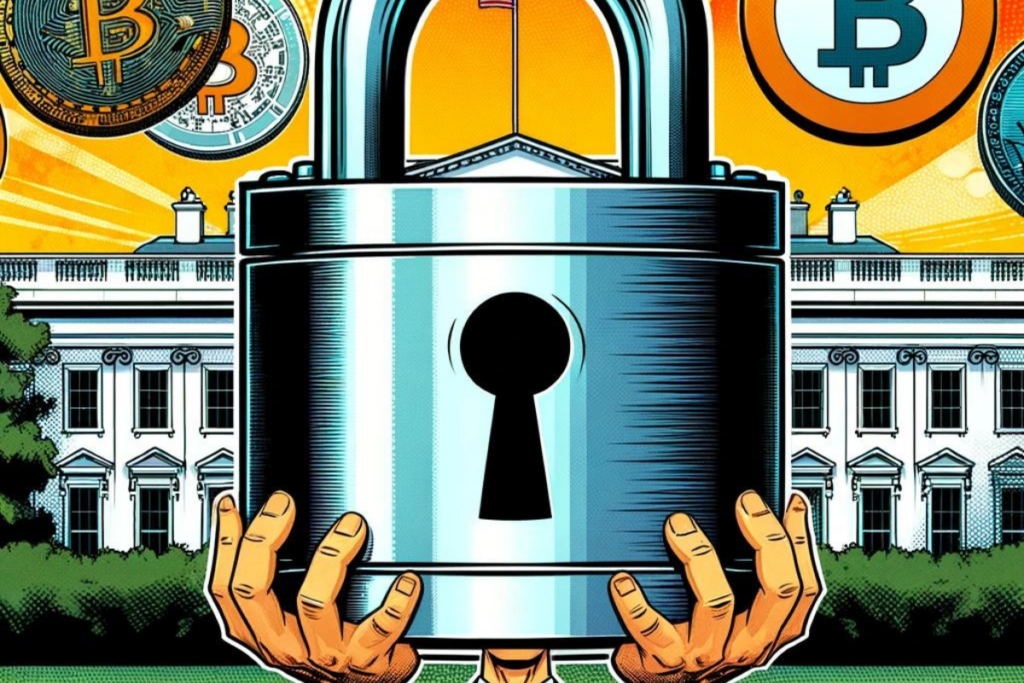Crypto: The White House Can Now Freeze Your Assets
A new American law grants the president unprecedented power to block access to cryptocurrencies. This legislative measure is causing significant concern due to its vast implications and potential impact on cryptocurrency users. With this law, the President of the United States can now exercise direct control over digital transactions.

Extended Powers and Implications
The new law gives the president broad powers to block access to digital assets. Scott Johnsson, an influential voice in the crypto field, has strongly criticized this legislation for its considerable scope.
According to him, this law could allow the president to prohibit access to any protocol or smart contract deemed non-compliant by the Secretary of the Treasury. The scope of this measure is astounding and could force users to turn to KYC (Know Your Customer) and authorized chains.
Johnsson expressed his concerns, emphasizing that the law could trap users in regulated chains, thus limiting their freedom to use cryptocurrencies. “It is hard to understand how this is not a presidential prohibition power at the user level,” he stated, highlighting the vast and potentially repressive implications of this measure.
Under this new law, the president can block transactions between American individuals and foreign entities identified as supporting terrorist organizations. He can also ban transactions through communication protocols, smart contracts, or software involving cryptocurrencies. This could have profound consequences for cryptocurrency users.
Senator Warner’s Legislative Move
On June 5, a user of X revealed the apparent strategic insertion of legislative elements by Senator Mark Warner. These elements grant the president new extended powers over digital assets.
Warner introduced this legislation in a December 2023 announcement, allowing the Treasury Department to tackle emerging threats involving digital assets.
The law broadly defines “digital assets,” encompassing any digital representation of value recorded on cryptographically secured distributed ledgers. This includes communication protocols, smart contracts, or other software deployed using distributed ledger technology or similar. This broad definition gives the president considerable leeway to intervene in various platforms and technologies.
In addition to blocking transactions, the president can impose strict conditions on foreign financial institutions holding accounts in the United States. If these institutions facilitate crypto transactions with entities supporting terrorist organizations, they could face severe sanctions. This measure aims to strengthen the control and surveillance of international financial flows.
Towards a Regulated Crypto?
Mr. Johnsson’s analysis suggests that the law’s broad applicability could force users to join blockchain networks compliant with KYC norms and authorized. This development could limit users to regulated blockchains, thus reducing decentralization and autonomy—elements that are central to cryptocurrencies.
Johnsson warns that this measure could be perceived as an attempt to exert control over cryptos under the guise of fighting terrorism.
The elements added by Warner, borrowed from the anti-terrorism financing law, reinforce this perception.
The new law could radically transform the use of cryptocurrencies, making users more vulnerable to governmental surveillance and control.
While this measure aims to strengthen national security and combat terrorism, it also raises crucial questions about users’ freedom and autonomy. The future of crypto under this new regulation remains uncertain, and only thorough and ongoing analysis will fully reveal its implications.
Maximize your Cointribune experience with our "Read to Earn" program! For every article you read, earn points and access exclusive rewards. Sign up now and start earning benefits.

Fascinated by Bitcoin since 2017, Evariste has continuously researched the subject. While his initial interest was in trading, he now actively seeks to understand all advances centered on cryptocurrencies. As an editor, he strives to consistently deliver high-quality work that reflects the state of the sector as a whole.
The views, thoughts, and opinions expressed in this article belong solely to the author, and should not be taken as investment advice. Do your own research before taking any investment decisions.